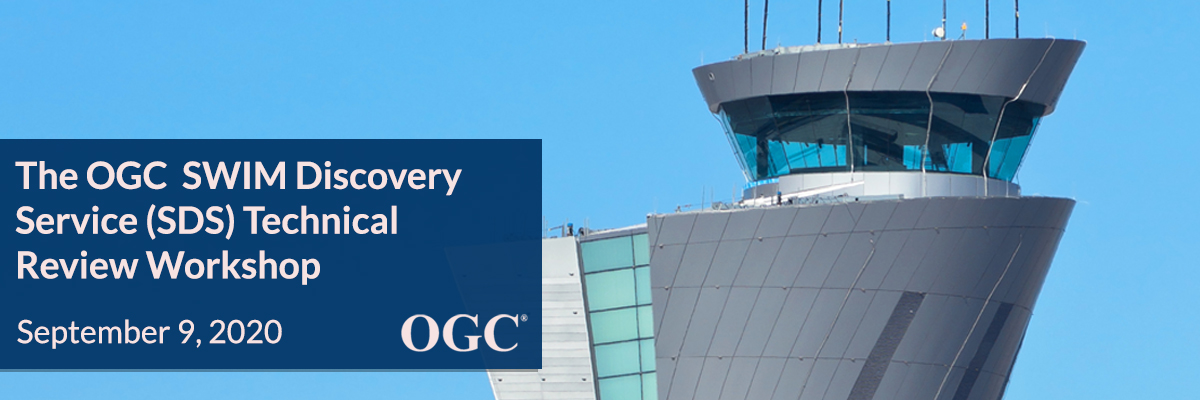
Workshop participants will be informed of a specification critical to the future of service discovery in a global SWIM environment.
The Open Geospatial Consortium (OGC) and the U.S. Federal Aviation Administration (FAA) invite participants to the SWIM Discovery Service (SDS) Technical Review Workshop, to be held virtually on September 9, 2020.
FAA SWIM program intends to use the workshop to solicit feedback from the OGC technical community on the latest draft of the FAA SWIM Discovery Service (SDS) Implementation Specification.
The SDS specification, developed by FAA, describes the enabling technologies and practices that support service discovery among independently developed and autonomously managed discovery mechanisms. The specification is designed to work specifically to improve service discovery across SWIM environments and to improve inter-SWIM interoperability discovery.
Service discovery is a critical success factor for the overall usability of a service. If a potential service consumer is unable to find a service, then a shared information environment like SWIM fails to achieve its purpose. At its most general level, service discovery is a process of locating information about services that may meet service consumer business needs.
OGC is hosting a 3-hour community workshop that will provide attendees an opportunity to learn about the new SDS specification directly from the FAA SWIM team. Participants will then be requested to relay technical feedback on its design and modeling, expected ease of implementation by developers, and scalability at a global level.
Who should respond?
- Members of the OGC Aviation Domain Working Group.
- Representatives of Air Navigation Service Providers (ANSP), such as developers, modelers, implementers, technical managers, or members of their SWIM teams.
- Software developers/technical managers from non-Aviation domains who have encountered similar use cases in their environments.
This is a call for interested parties to register their interest in participating in the workshop. OGC members and non-members alike are invited to contribute to this workshop. International representation is strongly encouraged from Europe, Canada, and the APAC region.
This is an excellent opportunity for the community to gain insights into the ongoing effort of building service meta-information exchange in the Global SWIM context. As such, it's also an opportunity to inject lessons learned from other domains and/or your own experience to accelerate the development of the specification and its uptake at a global level. You will get to influence inter-SWIM service discovery amongst ANSPs and improve global SWIM interoperability.
Outcomes of the workshop will be documented in the form of an OGC Engineering Report. The final report will be publicly available once released by the OGC Committees.
More information on the SWIM Discovery Service (SDS) Technical Review Workshop, including a draft agenda and registration details, can be found on the OGC website.
About FAA
The continuing FAA mission is to provide the safest, most efficient aerospace system in the world. The agency strives to reach the next level of safety and efficiency and to demonstrate global leadership in how it can safely integrate new users and technologies into its aviation system. Over the past 50 years, under the FAA, aviation has become central to the way Americans live and do business, linking people from coast to coast and connecting America to the world. To ensure aviation's future viability, FAA is now working with its federal and industry partners to develop a flexible aerospace system that fully responds to the changing needs of businesses and customers in the 21st century. The strength of the NextGen system depends on lower costs, improved service, greater capacity, and smarter security measures. That is why FAA has defined a vision of the future that integrates achievements in safety, security, efficiency, and environmental compatibility.
Visit faa.gov for more information.
About OGC
The Open Geospatial Consortium (OGC) is an international consortium of more than 500 businesses, government agencies, research organizations, and universities driven to make geospatial (location) information and services FAIR – Findable, Accessible, Interoperable, and Reusable.
OGC's member-driven consensus process creates royalty free, publicly available geospatial standards. Existing at the cutting edge, OGC actively analyzes and anticipates emerging tech trends, and runs an agile, collaborative Research and Development (R&D) lab that builds and tests innovative prototype solutions to members' use cases.
OGC members together form a global forum of experts and communities that use location to connect people with technology and improve decision-making at all levels. OGC is committed to creating a sustainable future for us, our children, and future generations.
Visit ogc.org for more info on our work.
“
